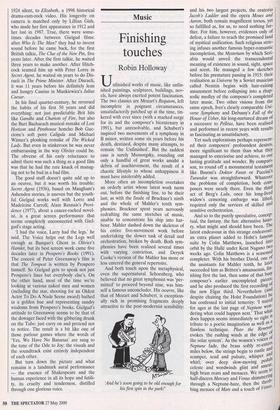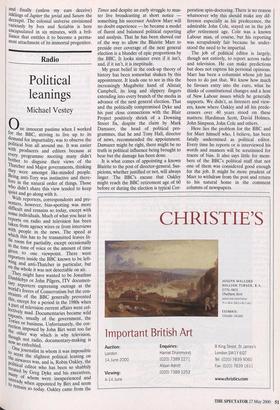Music
Finishing touches
Robin Holloway
nfinished works of music, like unfin- ished paintings, sculptures, buildings, nov- els, have always exerted potent fascination. The two classics are Mozart's Requiem, left incomplete in poignant circumstances, unsatisfactorily patched up at the time, tin- kered with ever since (with a marked surge for its and the composer's bicentenary in 1991), but unresolvable, and Schubert's inspired two movements of a symphony in B minor, written some six years before his death, destined, despite many attempts, to remain 'the Unfinished'. But the saddest case is surely Mussorgsky, rounding out only a handful of great works amidst a debris of inachievement, the result of a chaotic lifestyle to whose unhappiness it must have intolerably added.
More often an incompletion overtakes an orderly artist whose latest work turns out, before the finishing line, to be their last; as with the finale of Bruckner's ninth and the whole of Mahler's tenth sym- phonies. Bruckner spent years nervously redrafting the same stretches of music, unable to concentrate his ship into har- bour. Mahler dashed down the skeleton of his entire five-movement work before undertaking the slower task of detail and orchestration, broken by death. Both sym- phonies have been realised several times with varying conviction, and Deryck Cooke's version of the Mahler has more or less entered the general repertoire.
And both touch upon the metaphysical, even the supernatural. Schoenberg, who believed that no great symphonist was 'per- mitted' to proceed beyond nine, was him- self a famous unconcluder. His oeuvre, like that of Mozart and Schubert, is exception- ally rich in promising fragments deeply attractive to the post-modernist sensibility: And he's soon going to be old enough for his first spin in the park!' and his two largest projects, the oratorio Jacob's Ladder and the opera Moses and Aaron, both remain magnificent torsos, yet so fulfilled as, for us, to need nothing fur- ther. For him, however, evidences only of defeat, a failure to reach the promised land of mystical unification. Such religious striv- ing infuses another famous hyper-romantic incompletion, the Mysterium by which Scri- abin would unveil the transcendental meaning of existence in sound, sight, space and scent. He managed a few sketches before his premature passing in 1915: their realisation as Universe by a Soviet musician called Nemtin begins with hair-raising amazement before collapsing into a rhap- sodic medley of the composer's completed later music. Two other visions from the same epoch, Ives's clearly comparable Uni- verse Symphony and Debussy's Fall of the House of Usher, his long-nurtured dream of a successor to Pelleas, have been realised and performed in recent years with results as fascinating as unsatisfactory.
Yet such explorations perhaps represent- ed their composers' profoundest desires, more significant to them than what they managed to exteriorise and achieve, to our lasting gratitude and wonder. By compari- son, to round off a monumental testament like Busoni's Doktor Faust or Puccini's Turandot was straightforward. Whatever the problems of completion, both com- posers were nearly there. Even the third act of Berg's Lulu, once his long-lived widow's censoring embargo was lifted, required only the services of skilled and sensitive orchestration.
And so to the purely speculative, concep- tual, the fantasy, the fun: alternative histo- ry, what might and should have been. The latest endeavour in this strange endeavour: an extra planet added to Hoist's famous suite by Colin Matthews, launched into orbit by the Halle under Kent Nagano ON°, weeks ago. Colin Matthews is a seasoned completer. With his brother David, one of the assistants for Mahler tenth, he later succeeded him as Britten's amanuensis, fin' ishing first the last, then some of that busY composer's earlier uncompleted pieces and he also produced the first recording the new Elgar third. Nevertheless (an u despite chairing the Hoist Foundation) he, has confessed to initial temerity: 'I stared for ages at the last page of Neptune won- dering what could happen next.' That wha.t does happen seems immediately so right 's tribute to a poetic imagination as well as a flawless technique. Pluto the Renewer evokes 'the rushing winds at the edge of the solar system'. As the women's voices of _ Neptune fade, the brass softly re-enters, miles below, the strings begin to rustle aw", scamper, scud and pulsate, whisper Is whirl; over deep slow-moving Peclar, celeste and wordwinds glint and gill:, high brass rears and menaces. We seem, to half-discern Mercury and Venus shimnierwif through a Neptune-haze, then the throb bing menace of Mars and a touch of Venus, and finally (unless my ears deceive) inklings of Jupiter the jovial and Saturn the decrepit. The colossal universe envisioned variously by Ives and Scriabin is here encapsulated in six minutes, with a bril- liance that entitles it to become a perma- nent attachment of its immortal progenitor.



































































 Previous page
Previous page